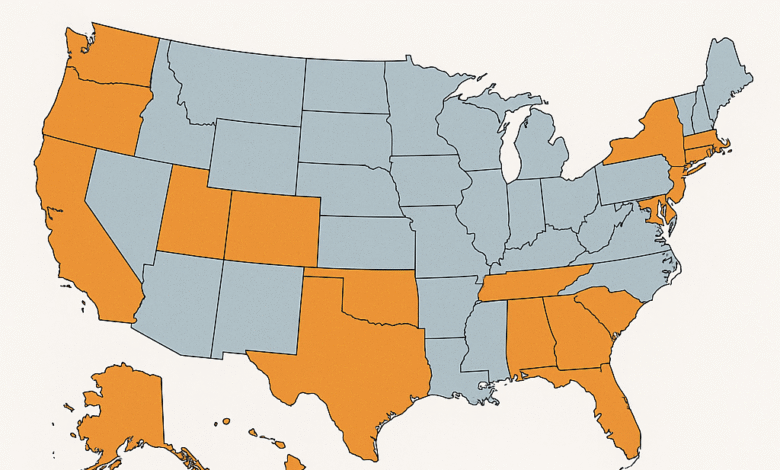States That Don’t Tax Retirement Income

Where you live when you retire, doesn’t have to be where you live when you are retired.
If you’re thinking about moving, one important consideration is taxes.
Here’s a short guide to help you decide, with updates for 2025 that impact how Social Security benefits were taxed in three states plus how military pensions were affected.
State income taxes can range as high as 13.3% – unless you live in a state that doesn’t tax retirement income. 😊
Nine states impose no income tax at all.
If you are a retiree, you can move to any one of those states and not pay any state income taxes on your retirement income.
But the list doesn’t end there. There are many other states that selectively exempt income from some retirement sources, like Social Security, pensions, military pensions, and distributions from defined contribution retirement plans.
Read More:
Table of Contents
- 9 States That Don’t Collect Income Tax
- 13 States That Don’t Tax Defined Contribution Plan Distributions
- 15 States That Don’t Tax Pension Income
- 35 States That Don’t Tax Military Pensions
- 41 States That Don’t Tax Social Security Income (Plus The District of Columbia)
- Is it Better to Live in a State that Doesn’t Tax Retirement Benefits?
9 States That Don’t Collect Income Tax
Nine states currently have no income tax. Since they don’t tax income, that also means they don’t tax retirement income.
The nine states with no income tax include:
- Alaska
- Florida
- New Hampshire*
- Nevada
- South Dakota
- Tennessee
- Texas
- Washington
- Wyoming
* New Hampshire had a 3% income tax levied on interest and dividend income received in 2024. However, this tax has been repealed starting January 1st, 2025.
13 States That Don’t Tax Defined Contribution Plan Distributions
As is the case with federal income tax, most states tax distributions from defined contribution plans.
These include traditional, SEP, and SIMPLE IRAs; 401(k), 403(b), 457, and Thrift Savings Plans (TSPs). However, 13 states don’t impose tax on defined contribution plan distributions. (Source: Bankrate)
You start with the nine that don’t tax income tax:
- Alaska
- Florida
- New Hampshire
- Nevada
- South Dakota
- Tennessee
- Texas
- Washington
- Wyoming
Then add these four states that don’t tax defined contribution plan distributions:
- Illinois
- Iowa
- Mississippi
- Pennsylvania
What about Roth IRA distributions?
Generally speaking, states follow the same tax treatment with Roth IRA distributions as the IRS. But since each state has its own tax code, you’ll need to check with your tax preparer or tax software program to determine if (and when) Roth IRA distributions can be taken tax-free.
* Note that in researching for this article, we could not identify a single authoritative source confirming conclusively that Roth IRA distributions can be taken tax-free in all 50 states and the District of Columbia.
15 States That Don’t Tax Pension Income
A total of 15 states don’t tax pension income. In addition to the nine states with no income tax, six additional states impose no income tax on pension income (also known as defined benefit retirement plans). (Source: Kiplinger)
- Alabama
- Hawaii
- Illinois
- Iowa
- Mississippi
- Pennsylvania
35 States That Don’t Tax Military Pensions
As of 2025, more than 35 states provide a complete exemption. A handful of states offer a partial exemption or credits, only Washington DC fully taxes military pension income.
These states offer a full exemption:
- Alabama
- Arizona
- Arkansas
- Connecticut
- Hawaii
- Illinois
- Indiana – fully exempts military retirement pay starting January 2025
- Iowa
- Kansas
- Louisiana
- Maine
- Massachusetts
- Michigan
- Minnesota
- Mississippi
- Missouri
- Nebraska
- New Jersey
- New York
- North Carolina
- North Dakota
- Ohio
- Oklahoma
- Pennsylvania
- Rhode Island
- Utah
- West Virginia
- Wisconsin
The following 13 states provide partial exemption from state income tax on military pensions:
- California – newly added to the partial list, exempting $20,000 of military retirement or survivor pay
- Colorado
- Delaware
- Georgia
- Idaho
- Kentucky
- Maryland
- Montana – allows up to 50% exemption with some qualifiers
- New Mexico
- Oregon
- South Carolina
- Vermont
- Virginia
Only one jurisdiction provide no exemption for military pensions – The District of Columbia.
41 States That Don’t Tax Social Security Income (Plus The District of Columbia)
A total of 41 states, plus the District of Columbia, exempt Social Security benefits from taxation. That includes the following 31 states (and D.C.) and the nine that impose no income tax whatsoever. (Source: The Tax Foundation):
- Alabama
- Arizona
- Arkansas
- California
- Delaware
- District of Columbia
- Georgia
- Hawaii
- Idaho
- Illinois
- Indiana
- Iowa
- Kansas
- Kentucky
- Louisiana
- Maine
- Maryland
- Massachusetts
- Michigan
- Mississippi
- Missouri
- Nebraska
- New Jersey
- New York
- North Carolina
- Ohio
- Oklahoma
- Oregon
- Pennsylvania
- South Carolina
- Virginia
- Wisconsin
The remaining 13 states provide partial tax exemption of Social Security income, either based on age or income level or with some other form of modification:
- Colorado
- Connecticut
- Minnesota
- Montana
- New Mexico
- North Dakota
- Rhode Island
- Utah
- Vermont
- West Virginia – to be phased out in 2026
Is it Better to Live in a State that Doesn’t Tax Retirement Benefits?
All things being equal, retirees are financially better off living in states that don’t tax retirement benefits. But as we all know, all things are seldom equal. So while state income taxes are an important consideration, they shouldn’t be the only deciding factor on where you should live out your golden years.
You must also consider other types of taxes, such as sales and real estate taxes.
For example, New Hampshire is one of the states with no income tax, but it has some of the highest property taxes in the country. In that case, the benefit of not paying income tax may be offset by higher property taxes.
Housing prices are another consideration. The state of Washington has no income tax, but the median price of a house is $552,000. The cost of purchasing a home in Washington state could easily cancel out the benefit of tax-free retirement income.
Insurance is another factor. Florida has no income tax and is a popular destination for retirees. But, the state also has the highest car insurance premiums in the country, at an average of $2,694 per year, and the highest average homeowner’s insurance premiums, at $10,996 per year.
All of this is to say that while the income tax impact on retirement is important, it’s just one piece of the puzzle. Living in a state that doesn’t tax retirement income is a major plus, but it can be offset by other costs that are not easily avoided.




